Literature Research Impact on Financial Reporting in Australian Firms
VerifiedAdded on 2023/06/07
|10
|1083
|197
Report
AI Summary
This report examines the impact of literature research on the financial reporting process within Australian companies, focusing on two key articles: one addressing contingent considerations in asset purchases under IFRS 3, IAS 16, and IAS 37, and the other analyzing the implications of IFRS goodwill accounting treatment. The research questions explored include the proper accounting of contingent assets and the role of accounting professionals when IFRS guidance is unclear, as well as the recognition, measurement, and valuation of goodwill, including the challenges in assessing fair values. The similarities lie in reviewing issues related to Australian accounting policies, while the differences are in the specific focus areas of contingent assets versus goodwill. The implications for Australian companies, accounting regulators, and investors are significant, particularly regarding the measurement of contingent considerations at fair value and the ambiguity in Australian accounting policies related to goodwill under IFRS, potentially leading to creative accounting practices.
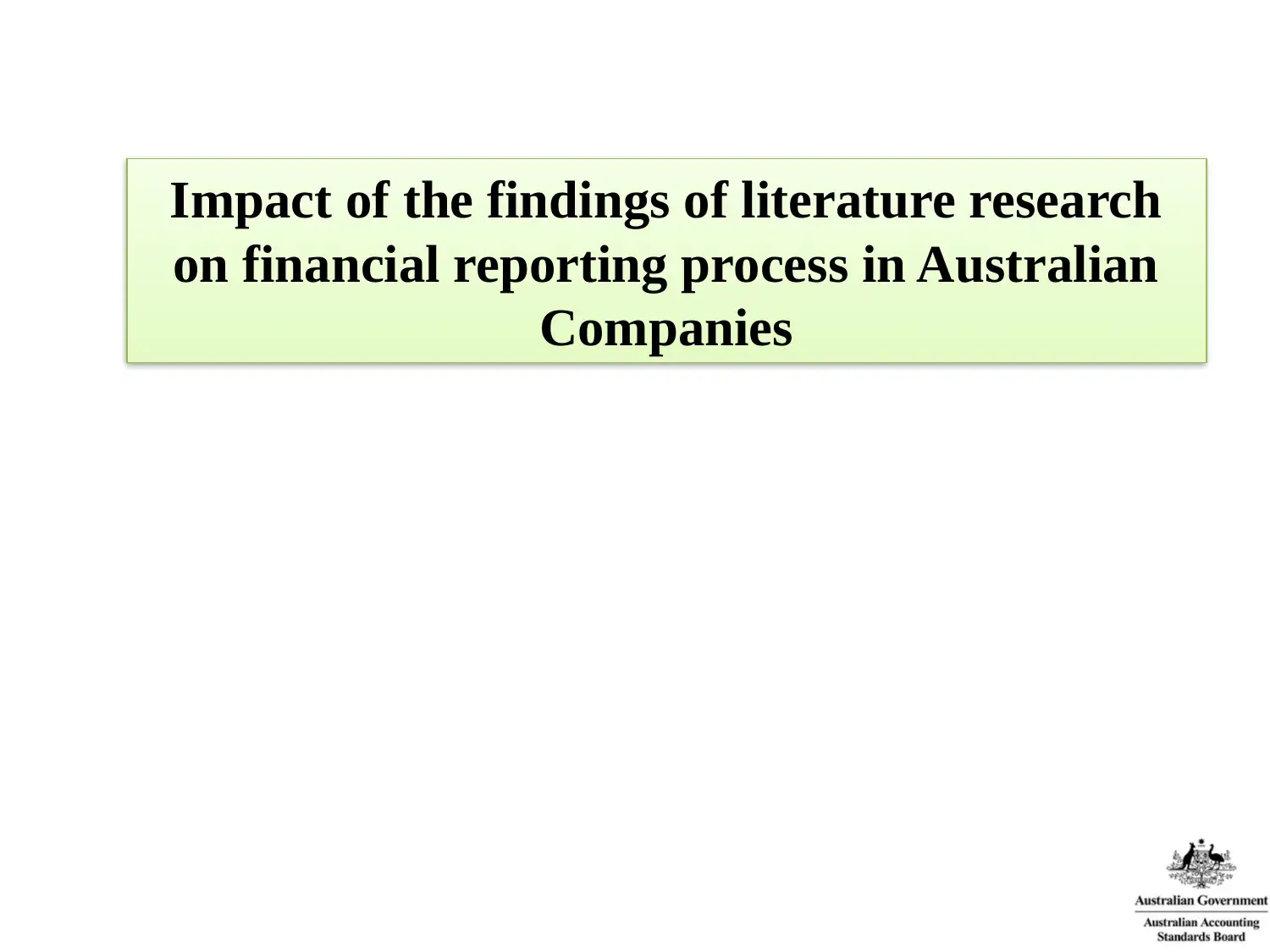
Impact of the findings of literature research
on financial reporting process in Australian
Companies
on financial reporting process in Australian
Companies
Paraphrase This Document
Need a fresh take? Get an instant paraphrase of this document with our AI Paraphraser
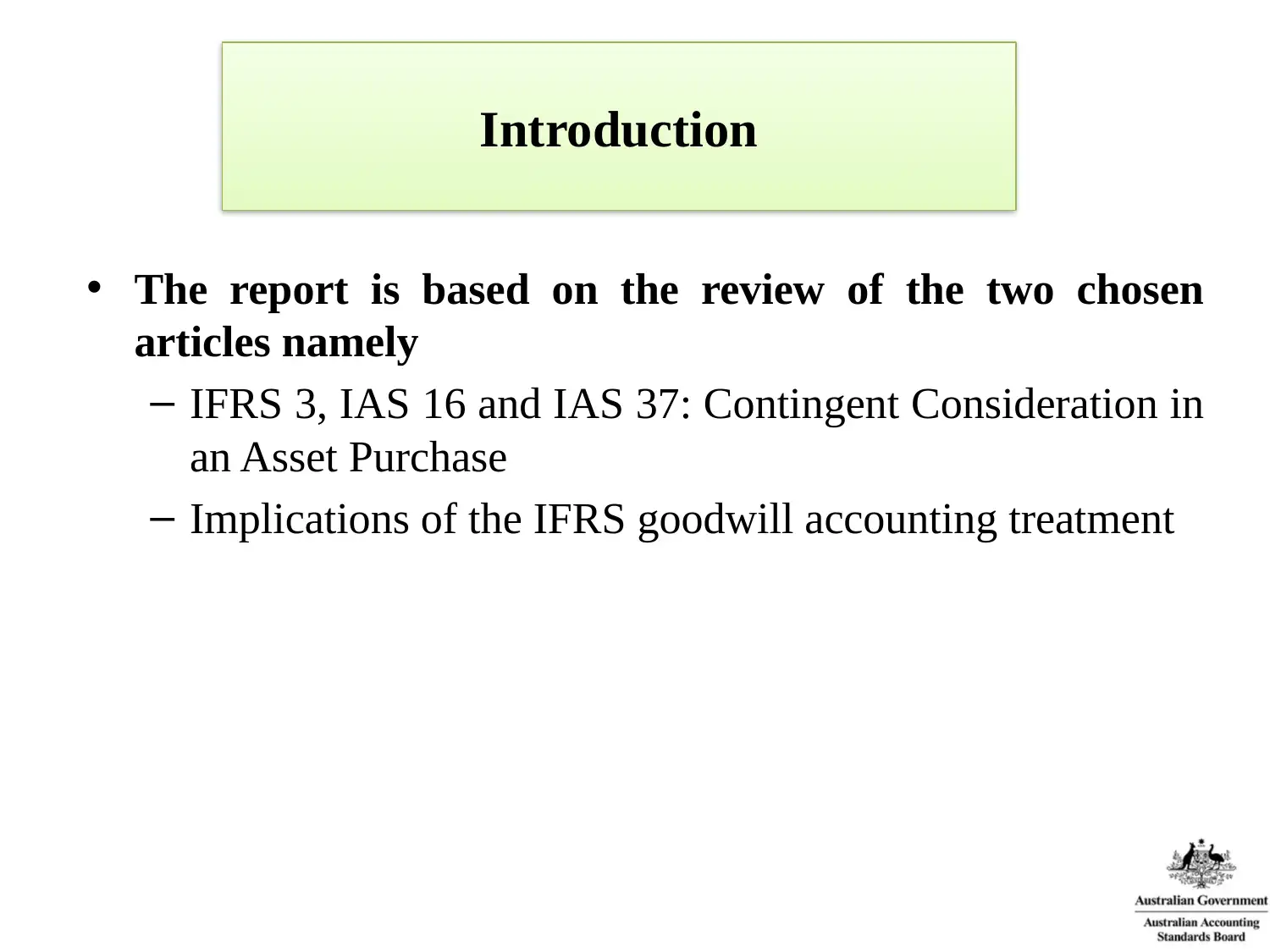
Introduction
• The report is based on the review of the two chosen
articles namely
– IFRS 3, IAS 16 and IAS 37: Contingent Consideration in
an Asset Purchase
– Implications of the IFRS goodwill accounting treatment
• The report is based on the review of the two chosen
articles namely
– IFRS 3, IAS 16 and IAS 37: Contingent Consideration in
an Asset Purchase
– Implications of the IFRS goodwill accounting treatment
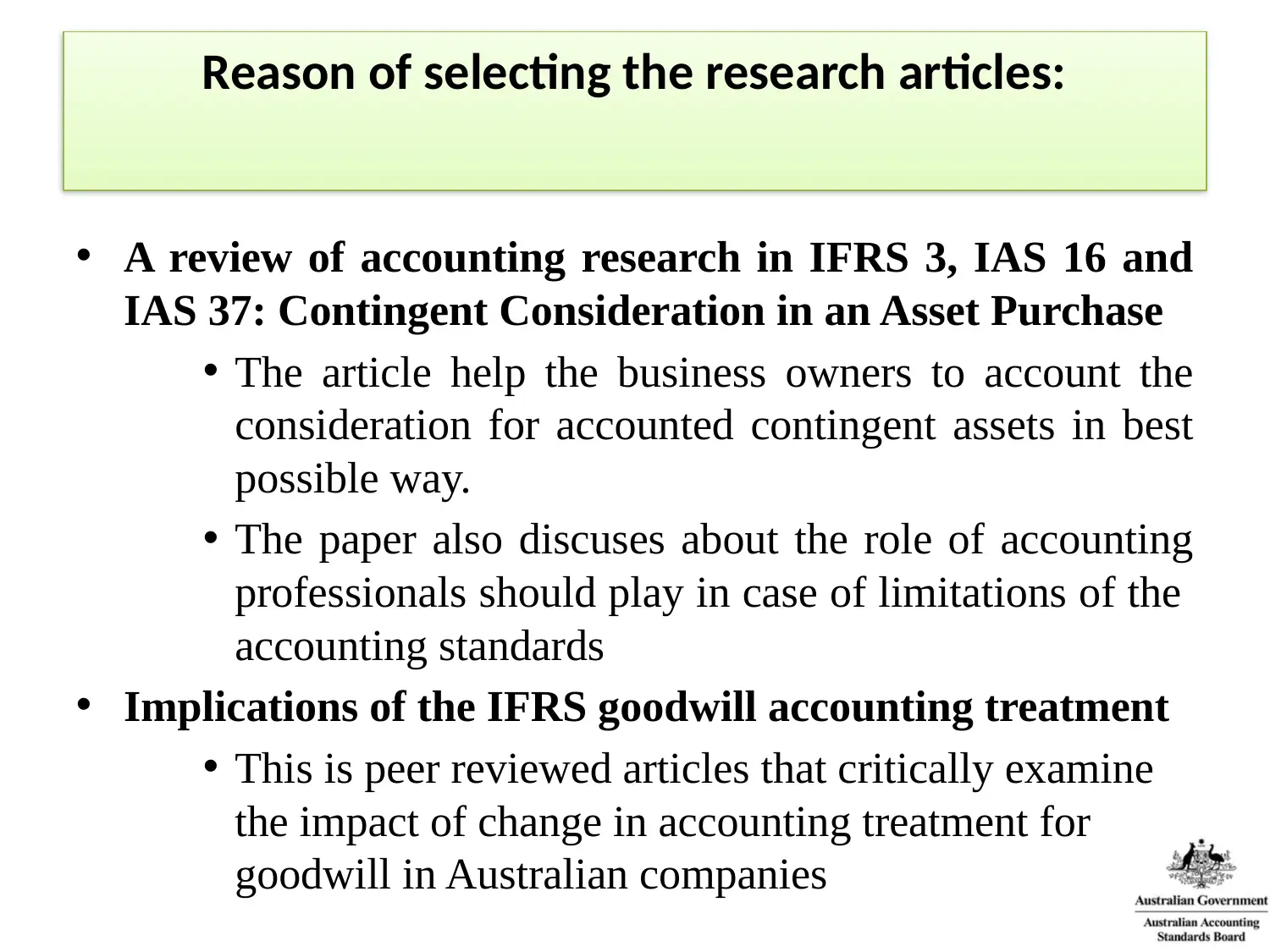
Reason of selecting the research articles:
• A review of accounting research in IFRS 3, IAS 16 and
IAS 37: Contingent Consideration in an Asset Purchase
• The article help the business owners to account the
consideration for accounted contingent assets in best
possible way.
• The paper also discuses about the role of accounting
professionals should play in case of limitations of the
accounting standards
• Implications of the IFRS goodwill accounting treatment
• This is peer reviewed articles that critically examine
the impact of change in accounting treatment for
goodwill in Australian companies
• A review of accounting research in IFRS 3, IAS 16 and
IAS 37: Contingent Consideration in an Asset Purchase
• The article help the business owners to account the
consideration for accounted contingent assets in best
possible way.
• The paper also discuses about the role of accounting
professionals should play in case of limitations of the
accounting standards
• Implications of the IFRS goodwill accounting treatment
• This is peer reviewed articles that critically examine
the impact of change in accounting treatment for
goodwill in Australian companies
⊘ This is a preview!⊘
Do you want full access?
Subscribe today to unlock all pages.

Trusted by 1+ million students worldwide
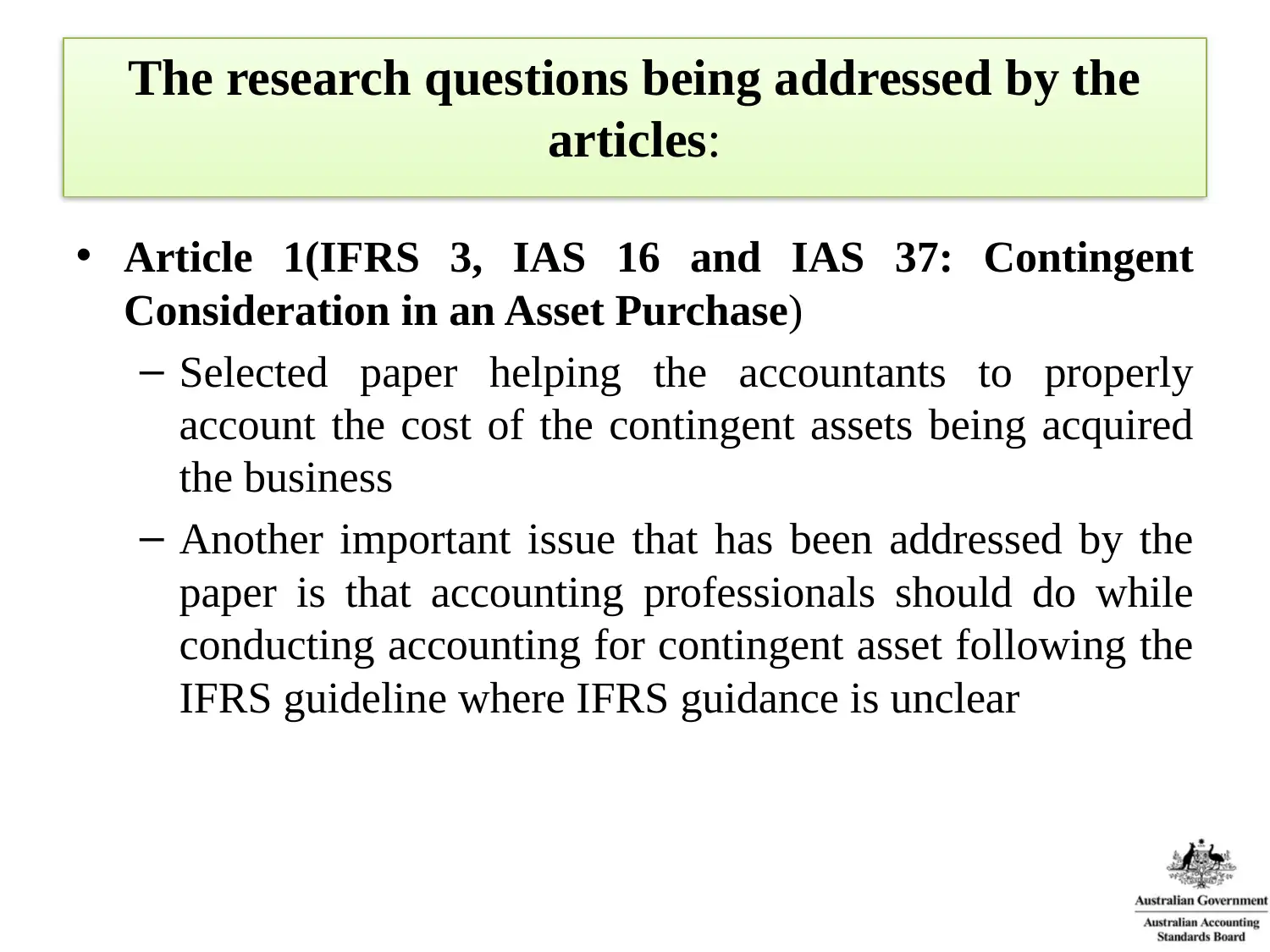
The research questions being addressed by the
articles:
• Article 1(IFRS 3, IAS 16 and IAS 37: Contingent
Consideration in an Asset Purchase)
– Selected paper helping the accountants to properly
account the cost of the contingent assets being acquired
the business
– Another important issue that has been addressed by the
paper is that accounting professionals should do while
conducting accounting for contingent asset following the
IFRS guideline where IFRS guidance is unclear
articles:
• Article 1(IFRS 3, IAS 16 and IAS 37: Contingent
Consideration in an Asset Purchase)
– Selected paper helping the accountants to properly
account the cost of the contingent assets being acquired
the business
– Another important issue that has been addressed by the
paper is that accounting professionals should do while
conducting accounting for contingent asset following the
IFRS guideline where IFRS guidance is unclear
Paraphrase This Document
Need a fresh take? Get an instant paraphrase of this document with our AI Paraphraser
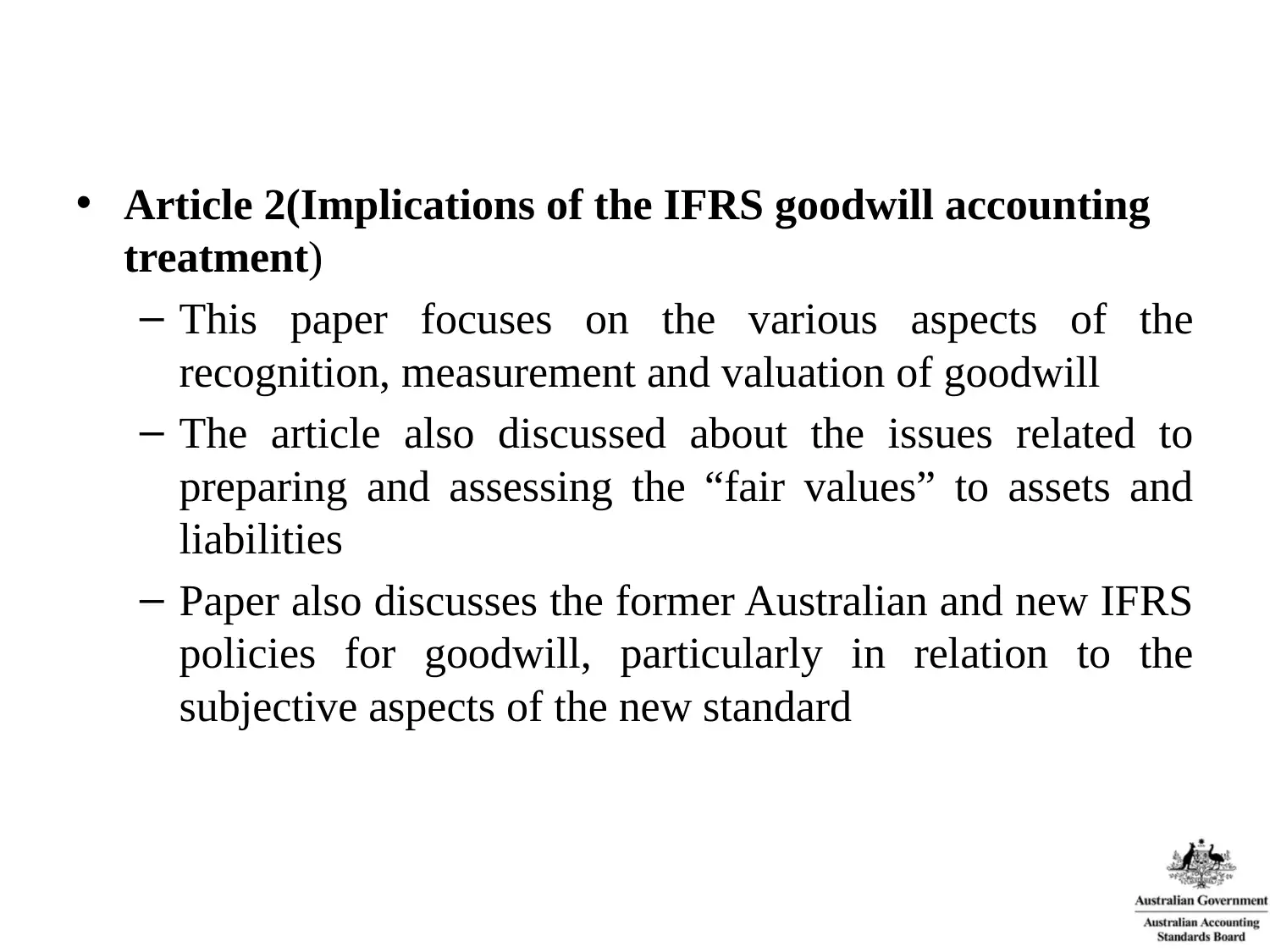
• Article 2(Implications of the IFRS goodwill accounting
treatment)
– This paper focuses on the various aspects of the
recognition, measurement and valuation of goodwill
– The article also discussed about the issues related to
preparing and assessing the “fair values” to assets and
liabilities
– Paper also discusses the former Australian and new IFRS
policies for goodwill, particularly in relation to the
subjective aspects of the new standard
treatment)
– This paper focuses on the various aspects of the
recognition, measurement and valuation of goodwill
– The article also discussed about the issues related to
preparing and assessing the “fair values” to assets and
liabilities
– Paper also discusses the former Australian and new IFRS
policies for goodwill, particularly in relation to the
subjective aspects of the new standard
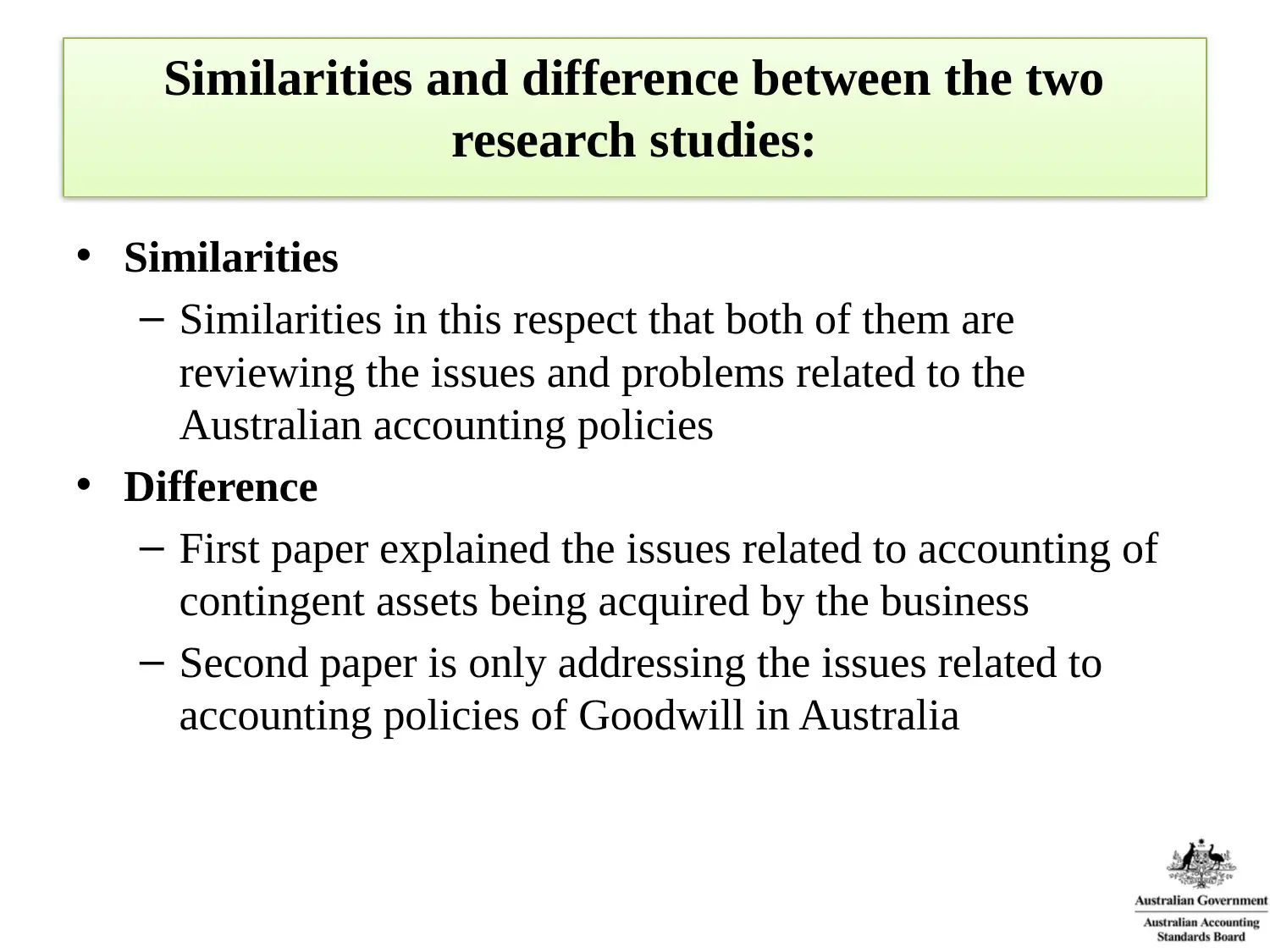
Similarities and difference between the two
research studies:
• Similarities
– Similarities in this respect that both of them are
reviewing the issues and problems related to the
Australian accounting policies
• Difference
– First paper explained the issues related to accounting of
contingent assets being acquired by the business
– Second paper is only addressing the issues related to
accounting policies of Goodwill in Australia
research studies:
• Similarities
– Similarities in this respect that both of them are
reviewing the issues and problems related to the
Australian accounting policies
• Difference
– First paper explained the issues related to accounting of
contingent assets being acquired by the business
– Second paper is only addressing the issues related to
accounting policies of Goodwill in Australia
⊘ This is a preview!⊘
Do you want full access?
Subscribe today to unlock all pages.

Trusted by 1+ million students worldwide
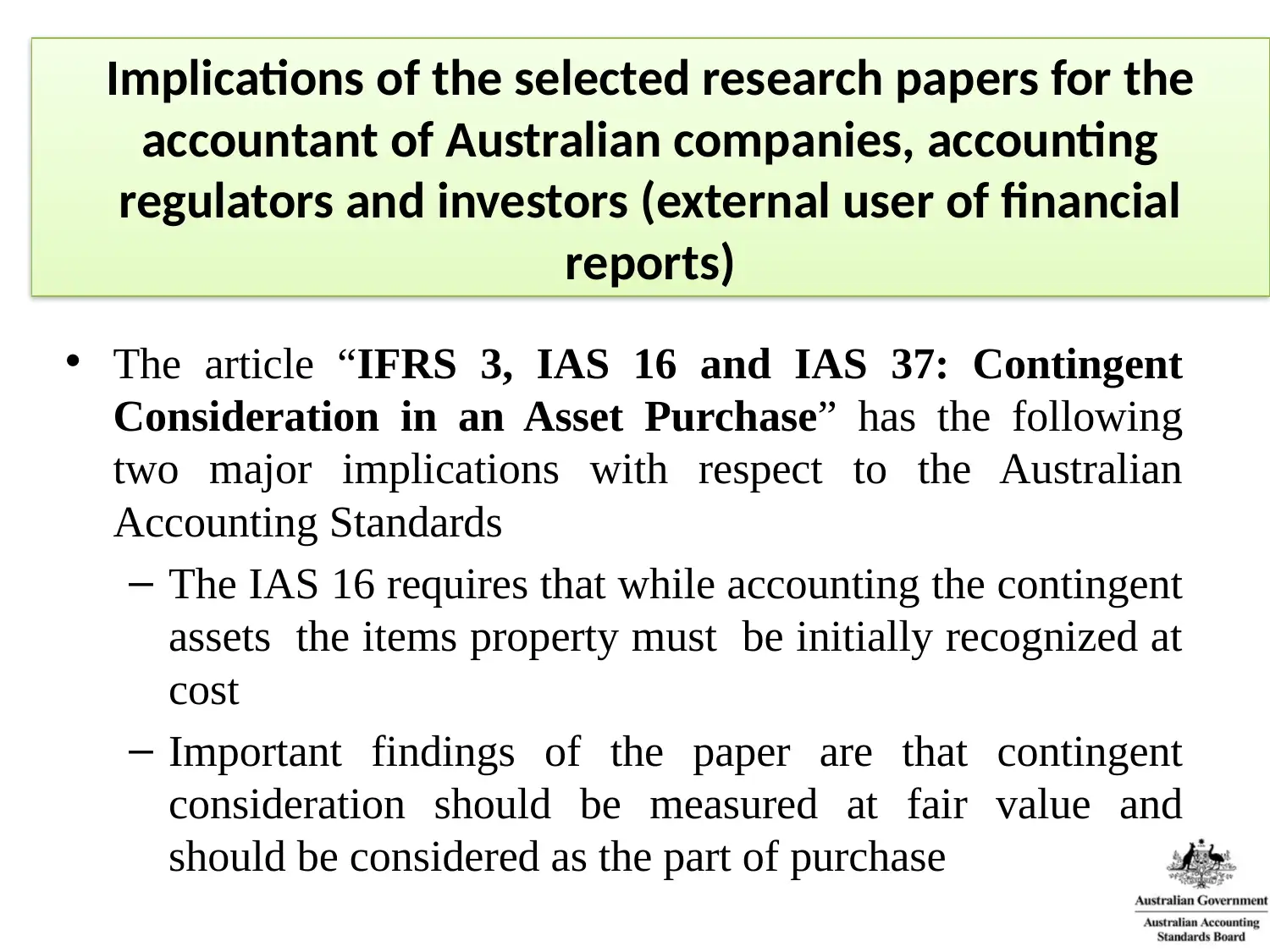
Implications of the selected research papers for the
accountant of Australian companies, accounting
regulators and investors (external user of financial
reports)
• The article “IFRS 3, IAS 16 and IAS 37: Contingent
Consideration in an Asset Purchase” has the following
two major implications with respect to the Australian
Accounting Standards
– The IAS 16 requires that while accounting the contingent
assets the items property must be initially recognized at
cost
– Important findings of the paper are that contingent
consideration should be measured at fair value and
should be considered as the part of purchase
accountant of Australian companies, accounting
regulators and investors (external user of financial
reports)
• The article “IFRS 3, IAS 16 and IAS 37: Contingent
Consideration in an Asset Purchase” has the following
two major implications with respect to the Australian
Accounting Standards
– The IAS 16 requires that while accounting the contingent
assets the items property must be initially recognized at
cost
– Important findings of the paper are that contingent
consideration should be measured at fair value and
should be considered as the part of purchase
Paraphrase This Document
Need a fresh take? Get an instant paraphrase of this document with our AI Paraphraser
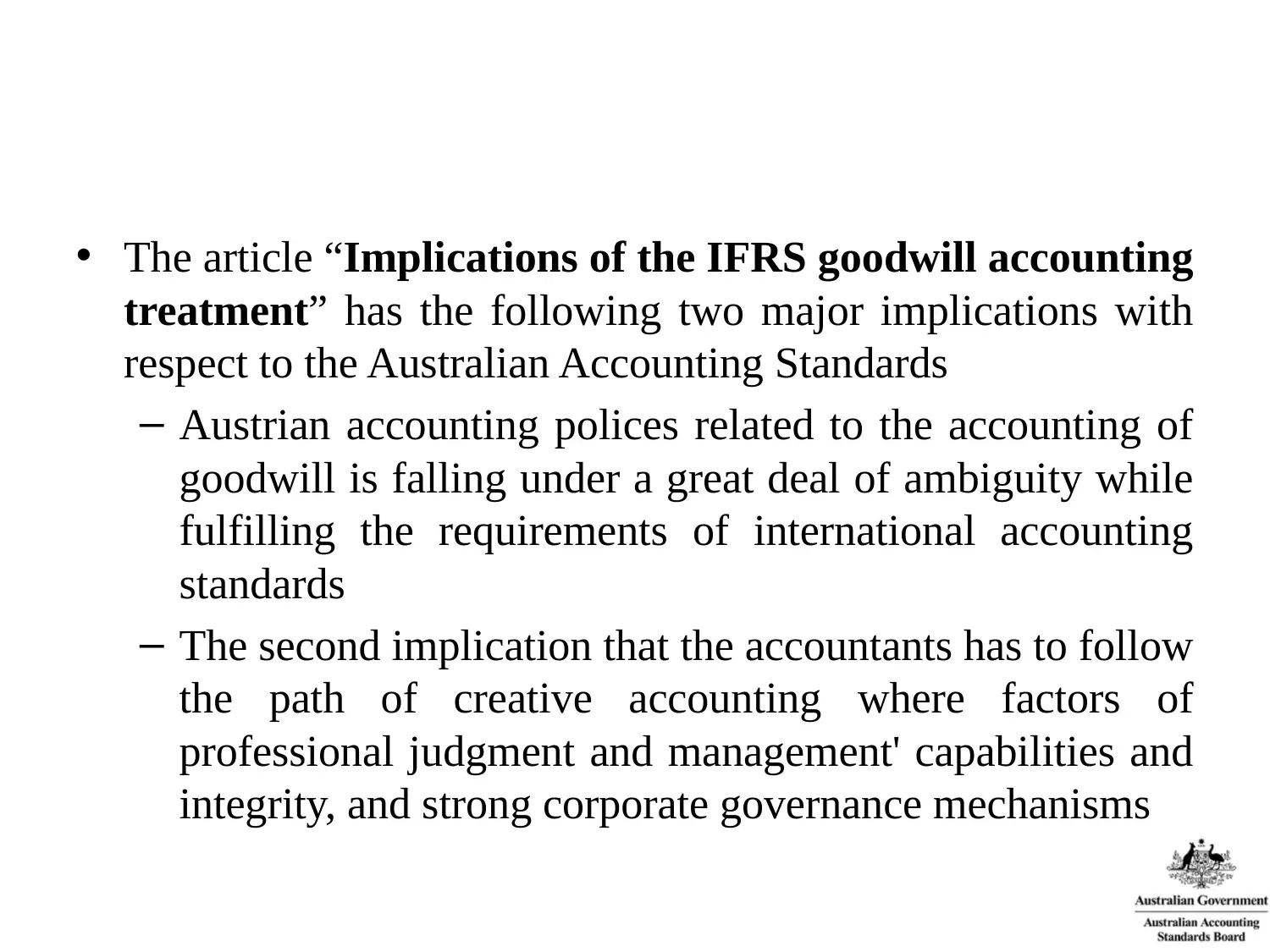
• The article “Implications of the IFRS goodwill accounting
treatment” has the following two major implications with
respect to the Australian Accounting Standards
– Austrian accounting polices related to the accounting of
goodwill is falling under a great deal of ambiguity while
fulfilling the requirements of international accounting
standards
– The second implication that the accountants has to follow
the path of creative accounting where factors of
professional judgment and management' capabilities and
integrity, and strong corporate governance mechanisms
treatment” has the following two major implications with
respect to the Australian Accounting Standards
– Austrian accounting polices related to the accounting of
goodwill is falling under a great deal of ambiguity while
fulfilling the requirements of international accounting
standards
– The second implication that the accountants has to follow
the path of creative accounting where factors of
professional judgment and management' capabilities and
integrity, and strong corporate governance mechanisms
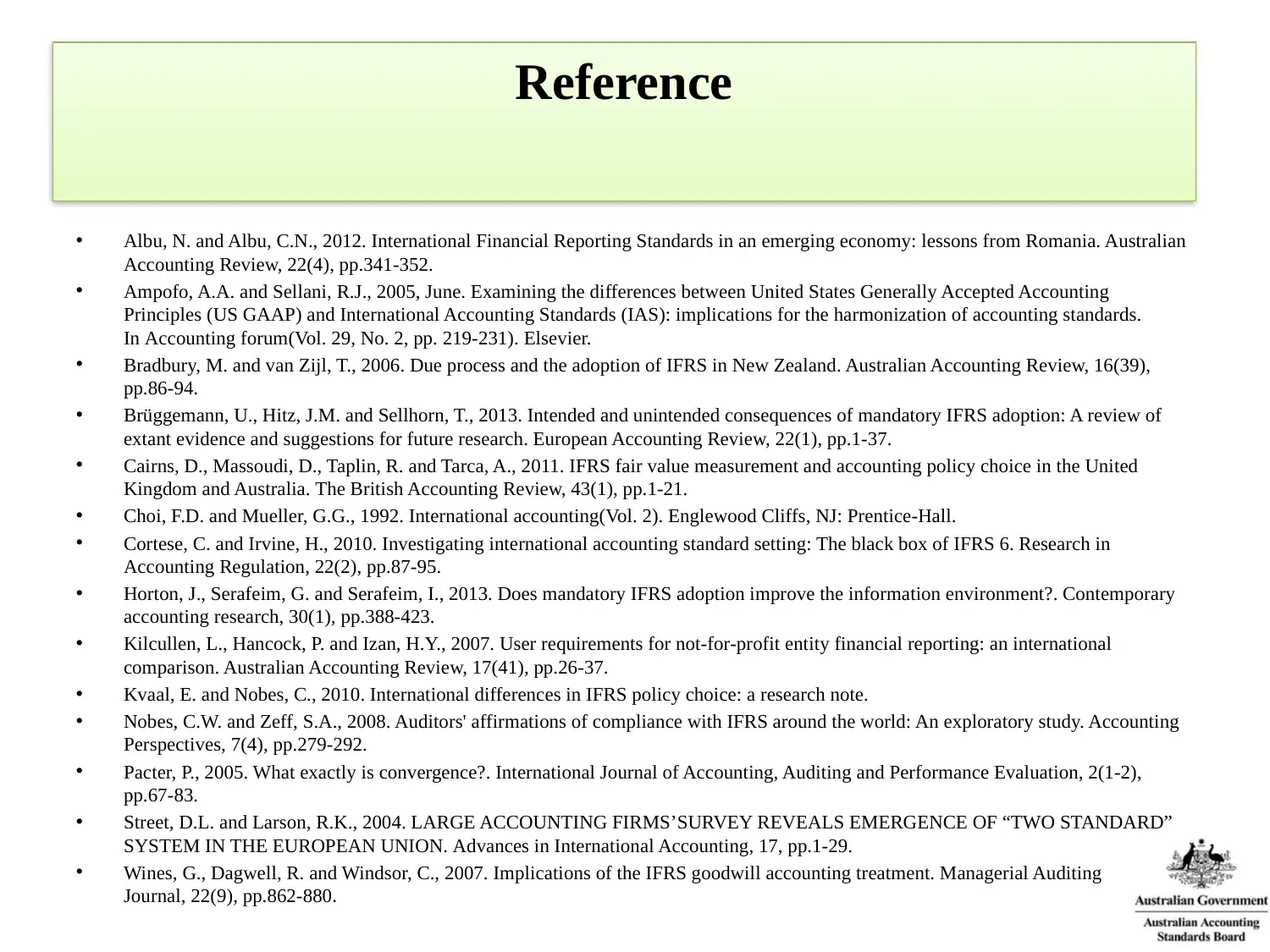
Reference
• Albu, N. and Albu, C.N., 2012. International Financial Reporting Standards in an emerging economy: lessons from Romania. Australian
Accounting Review, 22(4), pp.341-352.
• Ampofo, A.A. and Sellani, R.J., 2005, June. Examining the differences between United States Generally Accepted Accounting
Principles (US GAAP) and International Accounting Standards (IAS): implications for the harmonization of accounting standards.
In Accounting forum(Vol. 29, No. 2, pp. 219-231). Elsevier.
• Bradbury, M. and van Zijl, T., 2006. Due process and the adoption of IFRS in New Zealand. Australian Accounting Review, 16(39),
pp.86-94.
• Brüggemann, U., Hitz, J.M. and Sellhorn, T., 2013. Intended and unintended consequences of mandatory IFRS adoption: A review of
extant evidence and suggestions for future research. European Accounting Review, 22(1), pp.1-37.
• Cairns, D., Massoudi, D., Taplin, R. and Tarca, A., 2011. IFRS fair value measurement and accounting policy choice in the United
Kingdom and Australia. The British Accounting Review, 43(1), pp.1-21.
• Choi, F.D. and Mueller, G.G., 1992. International accounting(Vol. 2). Englewood Cliffs, NJ: Prentice-Hall.
• Cortese, C. and Irvine, H., 2010. Investigating international accounting standard setting: The black box of IFRS 6. Research in
Accounting Regulation, 22(2), pp.87-95.
• Horton, J., Serafeim, G. and Serafeim, I., 2013. Does mandatory IFRS adoption improve the information environment?. Contemporary
accounting research, 30(1), pp.388-423.
• Kilcullen, L., Hancock, P. and Izan, H.Y., 2007. User requirements for not‐for‐profit entity financial reporting: an international
comparison. Australian Accounting Review, 17(41), pp.26-37.
• Kvaal, E. and Nobes, C., 2010. International differences in IFRS policy choice: a research note.
• Nobes, C.W. and Zeff, S.A., 2008. Auditors' affirmations of compliance with IFRS around the world: An exploratory study. Accounting
Perspectives, 7(4), pp.279-292.
• Pacter, P., 2005. What exactly is convergence?. International Journal of Accounting, Auditing and Performance Evaluation, 2(1-2),
pp.67-83.
• Street, D.L. and Larson, R.K., 2004. LARGE ACCOUNTING FIRMS’SURVEY REVEALS EMERGENCE OF “TWO STANDARD”
SYSTEM IN THE EUROPEAN UNION. Advances in International Accounting, 17, pp.1-29.
• Wines, G., Dagwell, R. and Windsor, C., 2007. Implications of the IFRS goodwill accounting treatment. Managerial Auditing
Journal, 22(9), pp.862-880.
• Albu, N. and Albu, C.N., 2012. International Financial Reporting Standards in an emerging economy: lessons from Romania. Australian
Accounting Review, 22(4), pp.341-352.
• Ampofo, A.A. and Sellani, R.J., 2005, June. Examining the differences between United States Generally Accepted Accounting
Principles (US GAAP) and International Accounting Standards (IAS): implications for the harmonization of accounting standards.
In Accounting forum(Vol. 29, No. 2, pp. 219-231). Elsevier.
• Bradbury, M. and van Zijl, T., 2006. Due process and the adoption of IFRS in New Zealand. Australian Accounting Review, 16(39),
pp.86-94.
• Brüggemann, U., Hitz, J.M. and Sellhorn, T., 2013. Intended and unintended consequences of mandatory IFRS adoption: A review of
extant evidence and suggestions for future research. European Accounting Review, 22(1), pp.1-37.
• Cairns, D., Massoudi, D., Taplin, R. and Tarca, A., 2011. IFRS fair value measurement and accounting policy choice in the United
Kingdom and Australia. The British Accounting Review, 43(1), pp.1-21.
• Choi, F.D. and Mueller, G.G., 1992. International accounting(Vol. 2). Englewood Cliffs, NJ: Prentice-Hall.
• Cortese, C. and Irvine, H., 2010. Investigating international accounting standard setting: The black box of IFRS 6. Research in
Accounting Regulation, 22(2), pp.87-95.
• Horton, J., Serafeim, G. and Serafeim, I., 2013. Does mandatory IFRS adoption improve the information environment?. Contemporary
accounting research, 30(1), pp.388-423.
• Kilcullen, L., Hancock, P. and Izan, H.Y., 2007. User requirements for not‐for‐profit entity financial reporting: an international
comparison. Australian Accounting Review, 17(41), pp.26-37.
• Kvaal, E. and Nobes, C., 2010. International differences in IFRS policy choice: a research note.
• Nobes, C.W. and Zeff, S.A., 2008. Auditors' affirmations of compliance with IFRS around the world: An exploratory study. Accounting
Perspectives, 7(4), pp.279-292.
• Pacter, P., 2005. What exactly is convergence?. International Journal of Accounting, Auditing and Performance Evaluation, 2(1-2),
pp.67-83.
• Street, D.L. and Larson, R.K., 2004. LARGE ACCOUNTING FIRMS’SURVEY REVEALS EMERGENCE OF “TWO STANDARD”
SYSTEM IN THE EUROPEAN UNION. Advances in International Accounting, 17, pp.1-29.
• Wines, G., Dagwell, R. and Windsor, C., 2007. Implications of the IFRS goodwill accounting treatment. Managerial Auditing
Journal, 22(9), pp.862-880.
⊘ This is a preview!⊘
Do you want full access?
Subscribe today to unlock all pages.

Trusted by 1+ million students worldwide

THANK YOU
1 out of 10
Related Documents
Your All-in-One AI-Powered Toolkit for Academic Success.
+13062052269
info@desklib.com
Available 24*7 on WhatsApp / Email
![[object Object]](/_next/static/media/star-bottom.7253800d.svg)
Unlock your academic potential
Copyright © 2020–2026 A2Z Services. All Rights Reserved. Developed and managed by ZUCOL.





